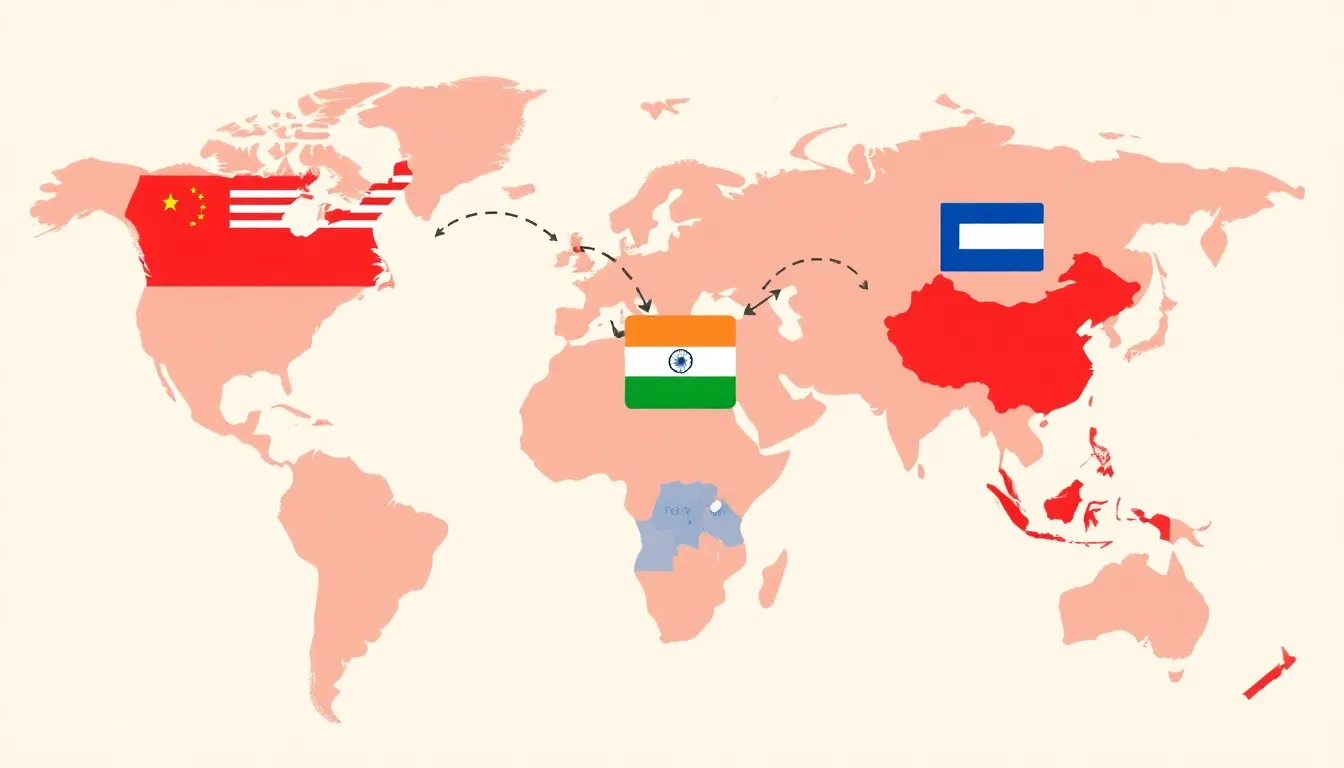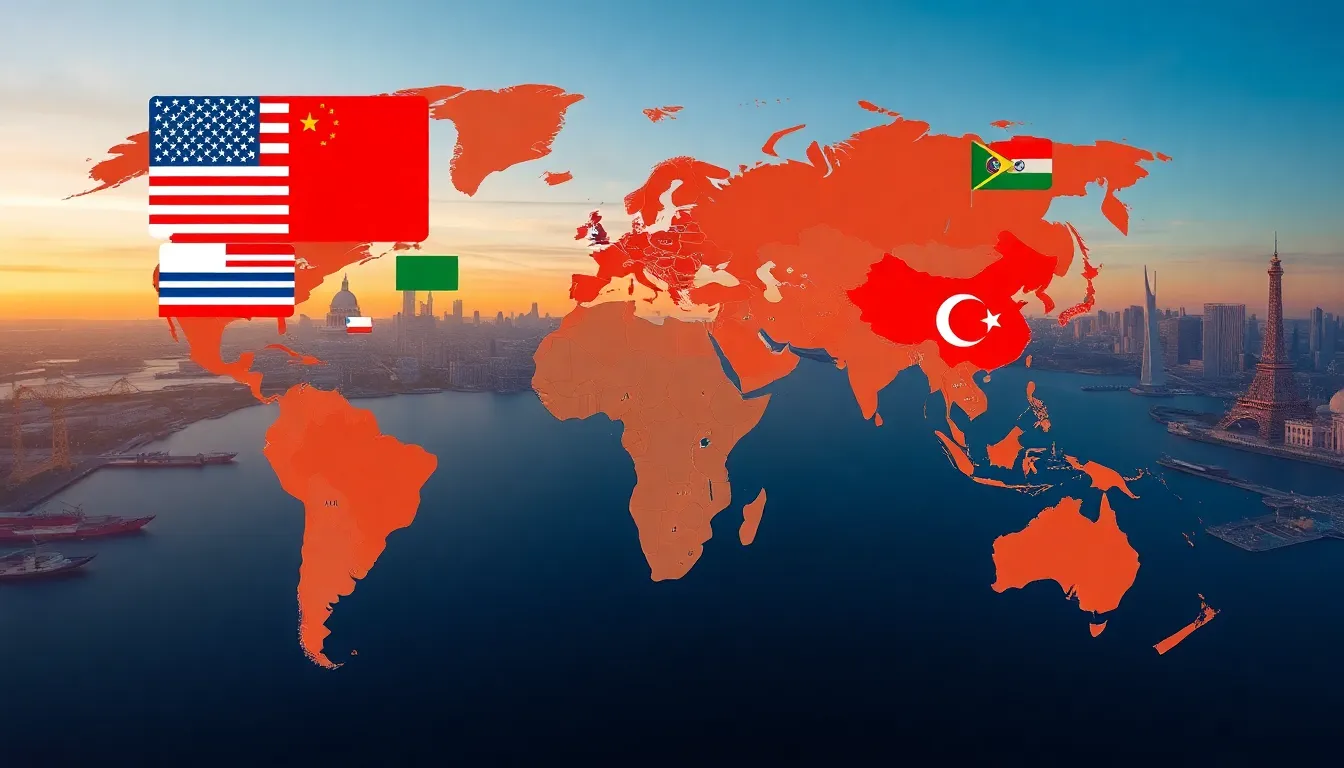Table of Contents
ToggleIn an increasingly interconnected world, global geopolitical issues shape the landscape of international relations and impact everyday lives. From territorial disputes to economic sanctions, these challenges influence global stability and security. Understanding the dynamics of power, alliances, and conflicts is crucial for anyone looking to grasp the complexities of today’s geopolitical climate.
As nations navigate their interests and ambitions, the interplay of diplomacy and conflict becomes more pronounced. Shifting alliances, emerging powers, and the rise of nationalism add layers of complexity to the global stage. This article delves into the pressing geopolitical issues facing the world today, offering insights into their implications and potential outcomes. By examining these factors, readers can better appreciate the intricate web of relationships that define our global society.
Overview of Global Geopolitical Issues
Global geopolitical issues encompass various challenges that significantly impact international relations and influence daily life. Key elements include territorial disputes, economic sanctions, and power dynamics, which all shape global stability and security.
Territorial disputes often arise from historical claims and resource competition. Examples include the South China Sea disputes involving China, Vietnam, and the Philippines. Such conflicts can lead to heightened tensions, military confrontations, and diplomatic strains among nations.
Economic sanctions serve as tools to exert pressure on nations perceived as threats. For instance, the sanctions imposed on Iran aim to curb its nuclear program. These actions can impact global trade, affect economies, and foster resentment among affected countries.
Power dynamics within the international system reflect a shift towards multipolarity, with emerging powers like India and Brazil challenging traditional hegemons. Alliances such as NATO and BRICS play crucial roles in shaping these dynamics, balancing power and influencing global governance.
Rising nationalism affects internal and external policies across nations, often leading to protectionist measures. Governments may prioritize national interests over international cooperation, complicating efforts to address global challenges like climate change, terrorism, and migration.
In this complex landscape, the interplay of diplomacy and conflict remains vital. Understanding these geopolitical issues provides insight into current global challenges, revealing the intricate relationships that define the international order.
Key Players in Global Geopolitics


Significant players in global geopolitics shape international relations through their strategic actions and alliances. Understanding these key actors—superpowers and regional powers—provides insight into the dynamics of global stability.
Superpowers and Their Influence
Superpowers dominate geopolitical landscapes, exerting influence through military capability, economic strength, and diplomatic reach.
- United States: Maintains a strong military presence worldwide, influencing global trade and security policies through alliances like NATO. It drives international economic systems via institutions like the World Bank and the International Monetary Fund (IMF).
- China: Rapidly growing in economic power, China challenges U.S. dominance. Its Belt and Road Initiative extends influence through infrastructure investments in developing countries, reshaping global trade routes and alliances.
- Russia: Utilizes energy resources and military interventions to assert its influence, particularly in Eastern Europe and the Middle East. Russia’s actions often disrupt regional stability and challenge Western interests.
- European Union: Represents a collective economic and political entity that promotes integration and stability among member nations. The EU plays a significant role in global trade agreements and environmental policies.
Regional Powers and Emerging Nations
Regional powers function as influential players within specific areas, impacting international relations and local security dynamics.
- India: As a rising power, India’s growing economy and military capabilities position it as a key player in South Asia. Its participation in global forums like the G20 and partnerships with the U.S. and Japan illustrate its increasing strategic importance.
- Brazil: Holds significant sway in South America, influencing regional trade and environmental policies. Brazil’s leadership in forums like BRICS showcases its intent to challenge traditional power structures.
- Turkey: Acts as a bridge between Europe and Asia, leveraging its strategic location. Turkey’s regional military engagements and diplomacy impact relations in the Middle East and beyond.
- Iran: Exercises influence through its geopolitical positioning and regional alliances. Its controversial nuclear program and involvement in proxy conflicts affect stability in the Middle East.
Understanding these players helps in grasping the complexities of current geopolitical issues and their implications for global governance and cooperation.
Current Global Geopolitical Issues
Numerous geopolitical challenges currently shape international relations, impacting global stability. Key areas of concern include tensions in Eastern Europe, disputes in the South China Sea, and ongoing conflicts in the Middle East.
Tensions in Eastern Europe
Tensions in Eastern Europe primarily stem from Russia’s actions in Ukraine. Following the annexation of Crimea in 2014, Ukraine has experienced persistent conflict in the Donbas region. NATO’s response includes enhancing military presence in Eastern Europe, with member nations like Poland and Lithuania increasing defense expenditures. The integration of Ukraine into Western institutions further exacerbates tensions, illustrating a stark divide between Western alliances and Russian influence.
The South China Sea Dispute
The South China Sea dispute creates ongoing geopolitical friction, as multiple nations assert territorial claims based on historical context and resource access. China maintains an assertive stance, constructing artificial islands and establishing military outposts. Neighboring countries, including Vietnam, the Philippines, and Malaysia, challenge these claims, backed by international rulings like the 2016 Permanent Court of Arbitration decision. The United States conducts freedom of navigation operations to counterbalance China’s influence, emphasizing the importance of maintaining open maritime routes for global trade.
Middle Eastern Conflicts
Middle Eastern conflicts continue to destabilize the region, driven by a complex interplay of sectarian divides, political strife, and external interventions. The Syrian civil war highlights the humanitarian crisis, with millions displaced and numerous factions involved, including U.S. forces combating ISIS. Iran’s influence expands through proxy groups, impacting relations with regional players like Saudi Arabia and Israel. Ongoing tensions between Israel and Palestinian factions complicate peace efforts. The U.S. withdrawal from Afghanistan further alters strategic dynamics, raising questions about American commitments in the region.
Future Trends in Global Geopolitics
Global geopolitics faces transformation due to multiple factors. Climate change and technological advancements, combined with the evolving security landscape, reshape international relations.
Impact of Climate Change
Climate change poses significant challenges to geopolitics, impacting resource distribution and national security. Increased natural disasters and extreme weather events create humanitarian crises, prompting migration and straining resources in host countries. Nations compete for access to water sources and arable land, particularly in areas prone to drought or flooding.
Coastal regions face threats from rising sea levels, leading to potential territorial disputes over maritime boundaries and exclusive economic zones. Countries with significant fossil fuel reserves may experience economic instability as the world transitions to renewable energy. The shifting focus on environmental sustainability influences diplomatic relations, as nations work together or against each other to address global warming, reflecting new power dynamics in the process.
Technological Advancements and Cybersecurity
Technological advancements significantly impact global geopolitics, particularly through cybersecurity challenges. States increasingly rely on digital infrastructure for security and communication, making them susceptible to cyber threats. Cyberattacks disrupt critical systems, expose sensitive information, and influence public opinion, thereby shaping political landscapes.
Nations engage in cyber warfare to gain strategic advantages, targeting both state and non-state actors. Technologies such as artificial intelligence and data analytics enable enhanced surveillance, which poses ethical dilemmas and privacy concerns. Competition over technological supremacy fosters tensions among nations, particularly between the United States and China, as both vie for leadership in crucial sectors like telecommunications and artificial intelligence. Cybersecurity strategies evolve as countries recognize the need for cooperation to address shared vulnerabilities while navigating conflicting interests.
Global geopolitical issues are intricately woven into the fabric of international relations and everyday life. As nations grapple with territorial disputes economic sanctions and shifting alliances the landscape of global politics continues to evolve. The emergence of new powers and the rise of nationalism further complicate cooperation on pressing challenges.
Understanding these dynamics is crucial for navigating the complexities of today’s world. The interplay of diplomacy conflict and technological advancements shapes not only national security but also the future of global governance. As countries face shared vulnerabilities they must find ways to collaborate while prioritizing their national interests. The path forward hinges on recognizing the interconnectedness of these issues and fostering dialogue to promote stability and security.




